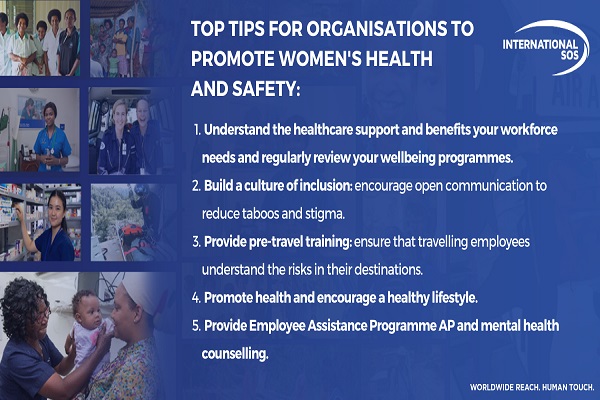
Follow us Now on Telegram ! Get daily 10 - 12 Interesting Updates. Join our Telegram Channel https://t.me/OhWomen
Download Telegram App before Joining the Channel
With International Women’s Day today, International SOS encourages employers to recognise how women’s health and safety issues can have a detrimental impact on their workforce, and to take steps to create a culture that promotes awareness and equity. International SOS’ case data shows top health concerns for females in 2022 included infectious diseases, respiratory illnesses, heart attacks and accidents and injuries. Requests for mental health assistance were common. Research shows that mental health issues affect both men and women, but not in equal measure1.
Dr Irene Lai, Group Medical Director at International SOS, comments “Organisations can do a lot to improve the health and safety of their female population. Gender-based differences need to be considered when developing policies for workplace wellbeing programmes, but importantly also for travel management programmes. Creating tailored wellbeing initiatives that respond directly to women’s specific health requirements can go a long way in increasing female employee engagement and ensuring that women feel supported and understood in the workplace. Awareness and education can help break down the stigma and create a culture where open and supportive conversations about all health issues, regardless of gender, are the norm.”
Female safety risks are also prevalent in both personal and professional settings. Women can face various forms of threats to their safety, such as physical and sexual violence, harassment, and discrimination. By acknowledging the unique challenges which women may experience and implementing policies and training that address these risks, organisations can create a safe and supportive environment for all employees.
Sally Llewellyn, Global Security Director at International SOS adds “Empowering women to participate in the same opportunities as their male colleagues, including travelling to or working in higher risk environments, is an important way to drive female participation in the workplace and offer diverse career pathways. Organisations can support this empowerment through sound risk management practices, including educating employees about security risks and mitigation measures based on the environments in which they’re operating and their individual profile.”
International SOS shares top tips on how organisations can help promote women’s health and safety:
1. Understand the healthcare support and benefits your workforce needs and regularly review your wellbeing programmes: survey your employees to better understand which workplace interventions would best support them
2. Build a culture of inclusion: encourage open communication to reduce taboos and stigma. Discussing employee wellbeing regularly, helps to normalise conversations and make them more inclusive
3. Provide pre-travel training: ensure that travelling employees understand the risks in their destinations, in particular differences or trouble spots that may apply to women
4. Promote health: provide employees with accurate information about health risks through participation in events such as International Women’s Day and World Health Days
5. Encourage a healthy lifestyle: motivate employees to adopt healthy lifestyle habits by providing healthy food choices at work, on-site exercise programmes and encourage regular health screening
6. Provide Employee Assistance Programme (EAP) and mental health counselling: provide support, guidance and information on a wide range of work related and personal issues that can affect employees’ mental health and wellbeing
Source-IANS